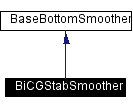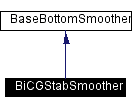
#include <BiCGStabSmoother.H>
Inheritance diagram for BiCGStabSmoother:


Public Methods | |
| BiCGStabSmoother () | |
| constructor, destructor default constructor | |
| virtual | ~BiCGStabSmoother () |
| destructor | |
| virtual BaseBottomSmoother * | new_bottomSmoother () const |
| void | setMaxIter (int a_max_iter) |
| set maximum number of BiCGStab iterations | |
| void | setSolverTol (Real a_solver_tol) |
| set solver tolerance | |
| void | setEnableRestart (bool a_enable_restart) |
| set whether to enable restart capabillity | |
| void | setVerbose (bool a_verbose) |
| set verbosity level | |
| virtual void | doBottomSmooth (LevelData< FArrayBox > &a_phi, const LevelData< FArrayBox > &a_rhs, LevelOp *a_levelop_ptr) |
| do smoothing | |
Protected Attributes | |
| int | m_maxIter |
| Real | m_solver_tol |
| Real | m_small |
| Real | m_converge_small |
| bool | m_enable_restart |
| bool | m_verbose |
The BiCGStabSmoother class implements the BiCGStab algorithm for LevelOp-derived classes
|
|
constructor, destructor default constructor
|
|
|
destructor
|
|
||||||||||||||||
|
do smoothing performs BiCGStab smoothing of L(a_phi) = a_rhs; L is the operator defined in a_levelop_ptr, and the preconditioner is a_levelop_ptr->smooth Implements BaseBottomSmoother. |
|
|
this gets around the "no virtual constructor" rule Implements BaseBottomSmoother. |
|
|
set whether to enable restart capabillity if this is true, if BiCGStab reaches a hang point, the solver will recompute the residual and attempt to restart the computation |
|
|
set maximum number of BiCGStab iterations set max number of BiCGStab iterations |
|
|
set solver tolerance set solver tolerance (amount residual must be decreased, etc) |
|
|
set verbosity level set whether i/o is done when solving (default is false) |
|
|
|
|
|
|
|
|
|
|
|
|
|
|
|
|
|
|
 1.2.16
1.2.16